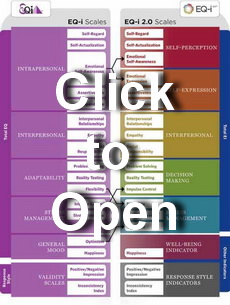Emotional intelligence refers to the ability of a person to manage his emotions in a healthy way and to respond appropriately to the feelings of others. Many psychologists speak of this ability in terms of a high or low emotional intelligence quotient (EQ). A child who scores high on EQ has an even-keeled temperament, and a realistic view of who he is and what he is capable of. As the child gets older, he is able to work through challenges appropriate for his age and come out more skilled and confident. Most importantly, children with high EQ are able to tolerate unpleasant emotions and recover from setbacks on their own or with the help of others. They are in tune with the people around them. A person who has these traits is generally happier than a person with low EQ because he can build healthy relationships with others, regulate his own emotions, and avoid unnecessary stress and confrontations.
Many of these abilities emerge and develop as a result of child's interaction with the environment, hence a positive relationship with parents plays a key role. Parents’ influence begins as early as infancy when they react to the child’s needs. When you respond to your crying child quickly and appropriately, you are calming their anxiety and teaching them to trust the world around them. Over time, your child picks up on your soothing ways and learns to sooth himself. It is important that you do not ignore or dismiss their negative emotions. It is important to empathize, accept and acknowledge them. Do not distract or teach your child to repress his emotions. Instead, provide him with time and support to process and manage his feelings. Teach him the words to express how he feels. A parent’s role includes leading by example, listening respectively and helping children talk about hard feelings. Talking about feelings openly and honestly teaches the child that feelings are important and should be paid attention to. This reduces their guilt over so called “bad feelings”, such as anger and jealousy, and teaches them that all feelings are OK. It also teaches them that other people have feelings similar to their own, which in turn helps children manage their social interactions more smoothly.
Following these simple strategies helps build child’s self-esteem. A child with healthy self-esteem believes herself to be good and lovable and feels ‘secure’ in her own value. On the flipside, a child with low self-esteem sees herself as not good enough and is ‘insecure’ in her own value. A loving and supportive relationship with parents is critical to help her develop better self-esteem and EQ. Such a secure bond develops early in the child’s life and comes from the child’s understanding that parents are in tune and responsive to her needs. When parents take time to play and interact positively with their child following the child’s interest and mood, they lay a foundation for the feeling of inner “goodness” and “value” in their children. As the child grows older, acknowledging hard work and praising effort reinforces her sense that she is capable, whereas praising specific traits undermines self-esteem. Consistent and reasonable discipline is also very important. Setting limits and enforcing them with empathy, not harshness, teaches children that their parents are caring and responsible.
It is important to teach children to acknowledge their unique talents and qualities as well as question what they believe to be their weaknesses. Help your child understand that they can use their strengths to solve problems. When your child becomes anxious because he is struggling, acknowledge their feelings and explain that it is quite normal to feel this way when he faces challenges and that tackling them becomes easier as he gets older and learns new things. Be a good role model by exemplifying the kind of attitude and behavior you want to see.
With a stable sense of happiness that comes from within, a child flourishes despite setbacks. She does not internalize them as personal and pervasive. She sees herself as powerful to change her circumstances and is resilient and optimistic. These traits give her the internal strength to manage her less positive emotions and overcome challenges. In other words, she possesses the qualities that are at the core of high emotional intelligence.
I am often asked about formal EQ testing, whether it is possible to measure it the same way as we measure child's IQ with gifted testing. There are few normative tests for evaluating EQ (as part of social-emotional assessment), most frequently used is EQ-i test developed by Dr. Reuven Bar-On and normalized on over 100000 people worldwide. The test includes 133 questions and, based on the answers to these question, psychologist can evaluate person's EQ score. The following picture (courtesy of MHS) shows EQ-i and EQ-i 2 scales and categories.
Image Credit: Trina Alexander - https://www.flickr.com/photos/paperdollimages/2408116011
